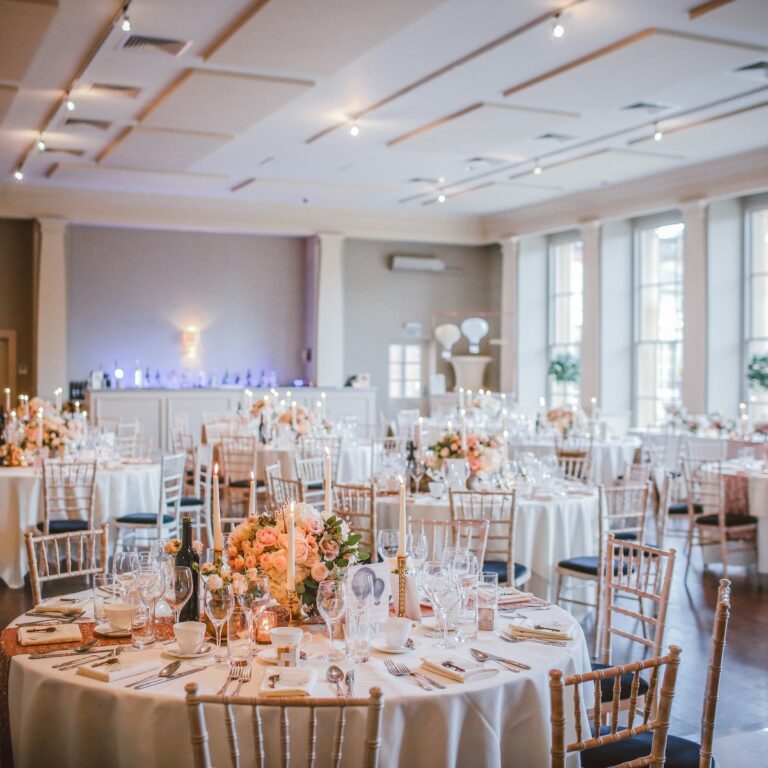If it seems like lately, all you and your fiancé do is argue about wedding planning—you’re not alone.
Most couples argue, and engaged ones are no different. Being betrothed doesn’t magically make everything sunshine and flowers, and the “newly engaged” glow can’t always stick around. You’re going to bicker, give the silent treatment or some attitude, and (sometimes) maybe even wonder if this whole wedding thing is a good idea.
Rest assured, arguments during wedding planning don’t translate to less love for one another.
Give yourselves grace. This is one of the most stressful times in your shared life—a life you probably haven’t been sharing very long, or are just now starting to combine—and your communication skills are still getting fine-tuned. You’re still learning what makes the other one tick, how to turn fights into discussions, and how to co-exist.
It’s no easy feat, as any married couple can attest.
While it helps to know you and your partner aren’t the only ones bickering 24-7, it doesn’t really solve the mystery of “why.”
Reasons You’re Fighting More With Your Fiancé
During wedding planning, stress reaches new heights. What’s more, we’re stressed about new things.
This means we’re seeing our partners in lights we haven’t seen before, and so are they. We’re shouldering new pressures, stretched thinner, and oftentimes just downright tired.
These factors are the perfect recipe for arguments. But the exact reason will boil down to the kind of fight you’re having.
And only by identifying that fight (or fights) can you begin to truly resolve it. Here are some of the most common arguments you’ll have before the wedding.
9 Common Arguments Engaged Couples Have During Wedding Planning
1. You disagree about the wedding budget.
By far, one of the most common fights couples have in marriage is regarding money.
So it stands to reason that wedding planning would entail the same arguments—this is, most likely, the biggest purchase either of you have ever made. And that’s bound to induce some anxiety and short tempers.
Finances are tough to talk about, even with the people we love and trust most. Part of why you and your fiancé keep arguing might be because you’re in uncharted waters.
Compounding this issue is if one of you is a natural saver, and the other is a natural spender.
There’s nothing wrong with either personality type. In fact, this opposites-attract pairing can be ideal! Savers encourage spenders to slow down and prepare for the future, while spenders urge savers to have more fun and live a little.
But, yes: opposites also clash, especially when it comes to setting a budget for your wedding.
Overall, the best cure to this pre-wedding argument is to talk more—not less. Make money no longer taboo by discussing it frequently: sharing your expenses, savings plans, and updating the wedding budget together.
And be open to compromise. Spenders can agree to cut some expenses or trim the guest list, while savers can work on accepting that some items just can’t be cut.
Finally, don’t be afraid to meet in the middle. If the spender wants $15k, but the saver thinks $10k is enough? $12k it is. You’re both forced to budge a little, while still getting some of what you want.
2. “I’m saving more money for the wedding than you are.”
Drilling down into the specifics of wedding budget arguments: it’s not always the plan that’s the problem, but the execution.
In other words, you agree on the wedding budget. But one of you is sticking to it way better than the other person. Or at least, it feels that way.
Whether someone’s overspending on a certain category, or not earning enough compared to the other, that unevenness will lead to resentment.
You’re a team, so it doesn’t really matter who’s saving more. Just that it gets saved. But still, it’s only fair that both people are contributing as much as they can—even if the amounts aren’t even.
Some easy solutions when one person needs to save more money include:
- An “out of sight, out of mind” approach. Set up a joint wedding account, where a portion of your paychecks get deposited every payday. Not seeing the money will make spending it less tempting—and reserve those funds for when they’re truly needed.
- Have a “no spend” month. Make a commitment (or a challenge, if you’re a competitive couple!) to not spend any money for one entire month. Bills, gas, and groceries are fine—but all impulse purchases, eating out, and extras are off-limits.
- Get a side hustle or second job. Devote the entirety of that job’s paycheck to the wedding fund—yes, 100% of it. Why? Well, if you’ve lived fine without that money so far, you know you can keep doing it. As a bonus, you’ll have less time to grab drinks or go shopping, saving even more money in the long-term.
- Split the wedding budget up into “yours and mine” categories. Instead of each person saving $10k for the $20k goal, consider dividing your expenses like chores. For example, one of you saves for the venue, while the other saves for the caterer.
3. “I’m doing so much more for this wedding than you are. You don’t even seem to care.”
This is another argument that’s common in marriage, not just among engaged couples: unequal division of labor. Especially the invisible “mental load.”
In daily life, this refers to the fact that women traditionally shoulder the burden of remembering and delegating tasks or chores—even if the physical part of those tasks gets split 50-50.
Similarly, the bride often becomes the bearer of the “wedding mental load.”
This includes:
- Researching vendors, venues, and all other wedding services and products
- Remembering to call vendors, schedule visits, and meet deposit deadlines
- Picking dresses and tuxes for the wedding party
- Making sure the wedding party orders their dresses and tuxes on time
…and literally hundreds of other details, ranging from tiny to huge. Even when the actual task is someone else’s responsibility, the bride or groom has to remember to set that task in motion, then follow up to ensure it got done—correctly, and on time.
In short, they become a project manager for the wedding, and that’s a heavy burden to carry alone.
Regardless of who it falls on, when one person feels they’re doing way more for the wedding than the other? It’s only a matter of time until that person snaps, and an argument ensues.
4. Past relationships and drama with exes keeps getting in the way.
While some arguments go away once wedding planning ends, a few are guaranteed to stick around if they don’t get fixed. This is always one of them.
Consider cutting contact with any old flames who like to stir the pot. Even if you two are friendly, it might not be worth the drama it causes in your relationship.
Of course, there are exceptions. Some exes make way better friends than they did partners, and don’t cause any drama whatsoever.
Others can’t be cut from our lives, like parents of our children.
But for the most part, it’s worth eliminating exes from our contact lists if it brings our partners peace of mind, and stops those fights before the wedding.
And fair’s fair: they’ll have to cut theirs, as well.
If it helps, think of it as a social decluttering—not too different from paring down your belongings when you moved in together.
5. Someone’s mother is becoming a momzilla.
Yours, his—it doesn’t matter who: meddling mothers (or any family member) raise tension in our relationship.
Whether she’s taking over wedding planning, criticizing your choices, or badmouthing you behind your back—there’s no shortage of ways for momzillas or mother-in-law-zillas to cause strife.
If it’s your partner’s mom, you might become resentful he’s not confronting her or standing up for you enough.
And if it’s yours, he might feel similarly. Or he’s upset you seem to be “letting her” take over and manipulate you.
This leads to projecting anger onto each other, distrust, and the feeling we’re second-best in our own partner’s life. And that, of course, leads to arguments.
6. One of you is having doubts about getting married.
Even if they aren’t voiced out loud, doubts about the wedding can lead to plenty of arguments.
Suddenly, everything is a fight. You aren’t even sure how it happens: normal conversation devolves into bickering, and then full-on arguing. That “honeymoon stage” you keep hearing about feels lightyears away.
Pre-marriage counseling can be invaluable, if you’re both open to the idea. You’ll learn how to more effectively communicate, and get to the root of what’s causing those doubts and cold feet.
7. “Your family hates me, and you never stand up for me with them.”
The momzilla problem extends to anyone in your partner’s life that dislikes you, or treats you poorly.
If your partner doesn’t take your side when those people mistreat you, that betrayal will quickly turn into distrust. You’ll start to wonder: do they not stick up for you because, deep down, they agree with everyone else?
Or are they spineless in general (a pretty unattractive quality to see in our partners)?
Either way, those questions lead to uneasiness, then anger and sadness. And that leads to distance and arguments.
This is a pretty common fight if you’re getting married young, too. Your family may not dislike your fiancé, or vice-versa, so much as feel worried you two will struggle more than necessary.
But the way they show that concern can still feel like they hate you, and how your partner handles it (or doesn’t) can make you feel angry, hurt, and utterly alone.
8. “All you talk about is the wedding now.”
When one partner talks frequently about the wedding—or one component of it, like the budget—the other person can easily become overwhelmed.
Suddenly, it feels like that’s all they care about. Conversations always end up there, no matter what they start with.
And, after a while, those tense wedding planning conversations evolve into arguments. The overwhelmed partner simply can’t stand to hear any more about the budget, bridesmaid drama, or vendor hiccups.
To the more invested partner, the overwhelmed person can come across as uncaring, lazy, or uncommitted (see Wedding Argument #3).
Whichever side you’re on, your partner being at odds with your stance starts to make both of you feel unheard.
9. “You’ve changed.”
They say wedding planning brings out everyone’s true colors, but I prefer to think of it as emphasizing them.
Sometimes, it’s in great ways. Other times, not so much.
Frugal people can become budget superstars…or miserly and jaded. Party-planner personalities might thrive pulling a wedding together—or easily over-extend themselves and burn out.
If your partner says you’ve changed, it’s likely they’re not seeing a new side of you: just stronger, once-in-a-lifetime versions of personality traits you already had.
And ironically, the ugly trait they’re seeing? It’s just the other side of the coin—the “pretty side” is actually a trait they love about us.
Go-getters who never take no for an answer also have the potential to become entitled and demanding. Organized and meticulous type-A’s can transform into nervous wrecks.
In short, there might be some truth to what your partner is saying. Maybe you have changed, in their eyes (or vice-versa). But it’s helpful to remember the other side of that coin, and how those traits also show up in ways we usually love.
How to Stop the Fights With Your Fiancé and Focus on the Future
Pre-marriage counseling is always my go-to recommendation when engaged couples in my life can’t stop fighting.
Professionals guide you through discussions, get to the root of your problems, and transform your communication style. They teach you to argue effectively (yes, there is such a thing as a productive fight!) and approach situations from the other’s POV.
Besides or in addition to counseling, try these solutions:
- Agree to a “no wedding talk after 7 pm” rule, or limit it to certain days of the week.
- Implement the “pause” method: as soon as a discussion gets too heated, either of you can say “pause.” You both walk away, take a break, and revisit when you’re calm.
- Stop using absolute terms. “You always do this” or “You never do that” kind of statements aren’t only unhelpful, they’re usually untrue. No human behaves the same 100% of the time. This language puts each other on the defensive, instead of actively listening.
- Instead, try “when” statements, and don’t state your feelings as facts. “When you ask how much wedding things cost, without wanting to know any other details or sharing your opinion on them, it makes me feel like the budget is your primary focus—not the wedding itself.”
- Only discuss the wedding in public. Out at dinner, in front of friends—anywhere you’re forced to stay calm and collected. Public settings help keep our emotions in check, in an automatic or subconscious way.
Some Arguments Are Inevitable During Wedding Planning—and Necessary
The simple truth here is that all couples fight. Dating, engaged, newlywed, or 50+ years of bliss; silent treatments, bickering, or all-out blowups.
And while planning your wedding, you and your fiancé are guaranteed to have more than a few arguments. This is likely your biggest challenge yet, and—so far, anyway—the most expensive, stressful purchase you’ve made.
But just because some fights are inevitable doesn’t mean they all are. Usually, the arguments in this list can be turned into productive discussions with thoughtful language, fair division of tasks, and ground rules you both agree on.
Even then, however, you’ll get some heated discussions—and that’s okay.
Arguments are symptoms of bigger issues. Mismatched communication styles, financial approaches, family drama: it’s actually a good thing these issues are coming to light now, before the wedding, so you can work together to resolve them.









